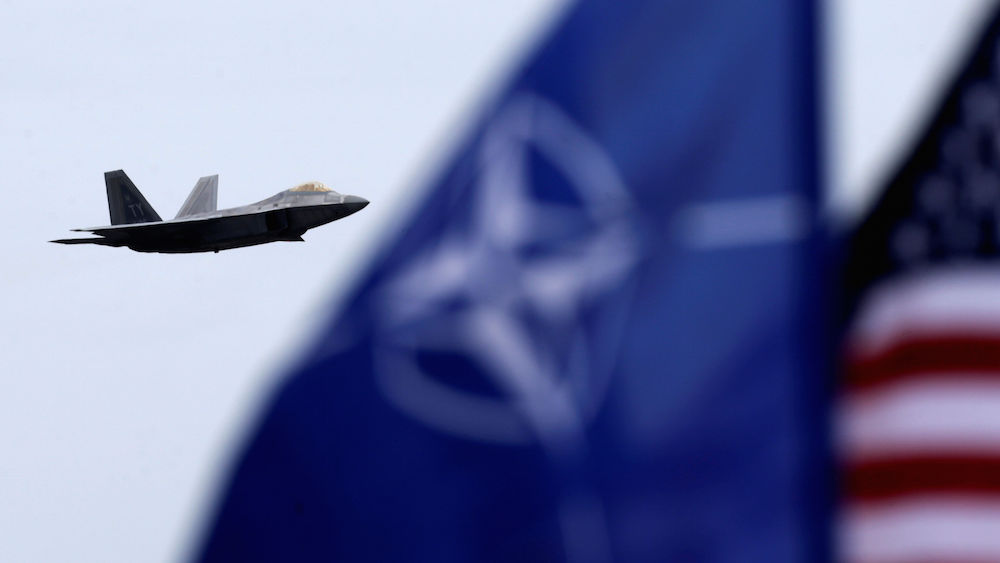Donald Trump isn’t the only American politician calling NATO’s value into question – for years now, a number of commentators have decried what they see as an excuse for European freeloading. They miss what the alliance achieves for the United States.
When Donald Trump suggested that the United States should only defend those NATO allies who foot their share of the bill, most commentators took him to task for putting America’s most successful alliance at stake. Some pundits, however, disagreed. In a flurry of articles, Trump supporters – as well as some Trump opponents – expressed their discontent with NATO.
According to some, Europeans are perfectly capable of paying for their own defense (“These NATO countries are not spending their fair share on defense,” CNN). Others warned that NATO had “needlessly antagonized Russia” by admitting the Baltic states back in 2004 (The Atlantic). Yet others opined that by committing to the defense of countries “in the suburbs of St. Petersburg” (Newt Gingrich on Estonia, CBS), NATO had become a major liability for US security. In short, NATO had become “a 20th century organization adrift in a 21th century world” and, hence, should be “phased out” (USA Today). Apparently, the GOP Presidential candidate had only articulated what many in the US were thinking but had been afraid to admit: that NATO has outlived its usefulness to the United States.
Has it? Clearly, NATO cannot thrive on Cold War nostalgia. The days when the US, Canada, and Western Europe kept the Soviet war machine in check are long gone. But those who adhere to the caricature of the alliance as a mere burden-shedding exercise for wily Europeans risk missing the forest for the trees. Yes, as a superpower with global security interests and commitments, the US considerably outspends its NATO allies. But it gets more in return than meets the eye.
Stability in Europe. Ensuring that a conflict in Europe does not lead once again to global war has been a major goal of US foreign policy since 1945. NATO has served this goal well: it prevented the Cold War from getting hot, and, at the Cold War’s end, provided a security home for the new democracies in Central and Eastern Europe. NATO also played an indispensable role in bringing peace to the Balkans after the violent collapse of Yugoslavia in the early 1990s.
Given the United States’ security interests, as well as the fact that the US and Europe form the world’s largest trade and investment relationship, America’s need to maintain influence on European issues should be a no-brainer. NATO is the major institutional framework that legitimizes such a US role. Through NATO, the US has become, in effect, a “European power”, with a unique voice in European affairs. Without NATO, a major political and military “transmission belt” would be lost, and American weight in Europe would be much reduced.
A “red line” for Russia. Russia’s current military and political assertiveness demonstrates that geopolitics did not end with the Cold War. Preventing the nuclear-armed Eurasian great power from intimidating its European neighbors requires a kind of balance that Europe, as a conglomerate of mostly smaller states, simply cannot provide if left to its own devices. Once the US enters the equation, however, the picture changes. As a military power second to none, the US, together with its NATO allies, can draw credible “red lines” that can keep Russian adventurism in check.
The good news is that such a deterrence posture comes with a much smaller price tag than the massive military presence that the US maintained in Europe during the Cold War. But a complete bailing out of European security would lead America’s challengers to conclude that Washington no longer has the guts to uphold the liberal order. As a result, Washington’s red lines would be tested around the world. Hence, if the US wants to remain a global power, it will have to remain a “European power” as well.
Reliable Allies. Given the multitude of security challenges, Winston Churchill’s observation that the one thing worse than fighting with allies is to fight without them still rings true. NATO provides the US with allies that are more militarily capable, more interoperable, and more willing to share risks and burdens. In Afghanistan, for example, even though some NATO allies suffered major casualties, none of them quit. Achieving consensus in NATO can be tedious at times, but once allies agree on a certain course of action, they will carry it through.
True, coalitions of the willing may be easier to put together. Yet they also tend to dissolve much more easily, and the US has to provide an even higher percentage of troops and equipment than to NATO-led operations. Whether Afghanistan, Libya, or countering the so-called Islamic State – when the challenge requires a sustained, long-term effort, using NATO, or at least its tried-and-tested procedures, is still the best option. Moreover, in NATO Washington finds almost 30 member countries around the same table, predisposed to working with the US. Everywhere else in the world Washington has to work through complicated bilateral relationships without getting as much in return.
For all these reasons, reducing NATO to the issue of fair of unfair burden-sharing has it wrong. To be sure, the fact that European defense spending trends are finally pointing upwards again is a most welcome development, but NATO is about much more than money: it is a long-term strategic alliance, which provides tremendous strategic value for the US, Europe, and indeed the West at large. Long-term strategic alliances deserve better than being judged by short-term tactical and electoral considerations.
NB. The author expresses his personal views.







